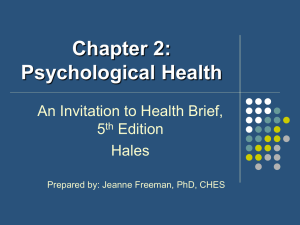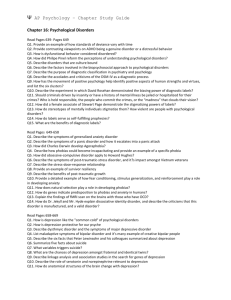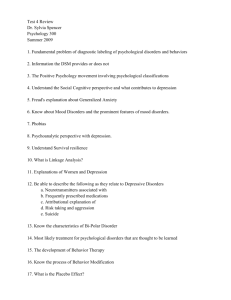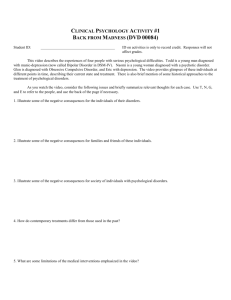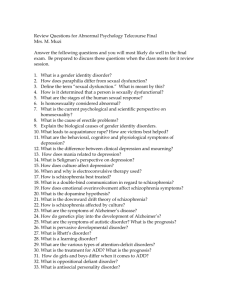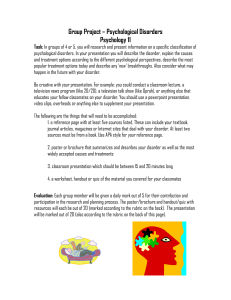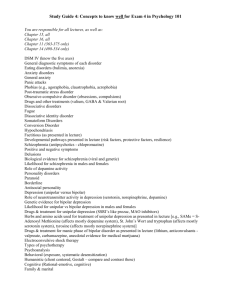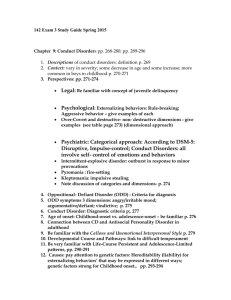Document 10892387
advertisement
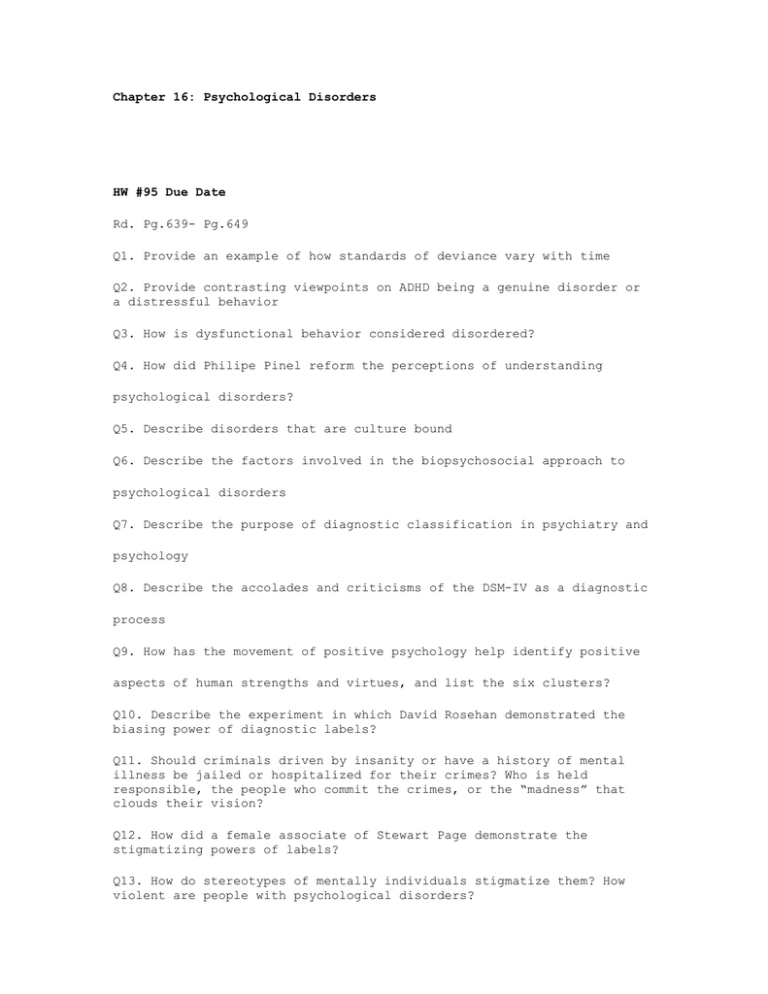
Chapter 16: Psychological Disorders HW #95 Due Date Rd. Pg.639- Pg.649 Q1. Provide an example of how standards of deviance vary with time Q2. Provide contrasting viewpoints on ADHD being a genuine disorder or a distressful behavior Q3. How is dysfunctional behavior considered disordered? Q4. How did Philipe Pinel reform the perceptions of understanding psychological disorders? Q5. Describe disorders that are culture bound Q6. Describe the factors involved in the biopsychosocial approach to psychological disorders Q7. Describe the purpose of diagnostic classification in psychiatry and psychology Q8. Describe the accolades and criticisms of the DSM-IV as a diagnostic process Q9. How has the movement of positive psychology help identify positive aspects of human strengths and virtues, and list the six clusters? Q10. Describe the experiment in which David Rosehan demonstrated the biasing power of diagnostic labels? Q11. Should criminals driven by insanity or have a history of mental illness be jailed or hospitalized for their crimes? Who is held responsible, the people who commit the crimes, or the “madness” that clouds their vision? Q12. How did a female associate of Stewart Page demonstrate the stigmatizing powers of labels? Q13. How do stereotypes of mentally individuals stigmatize them? How violent are people with psychological disorders? Q14. How do labels serve as self-fulfilling prophecies? Q15. What are the benefits of diagnostic labels? HW #96 Due Date Rd. Pg. 649-658 Q1. Describe the symptoms of generalized anxiety disorder Q2. Describe the symptoms of a panic disorder and how it escalates into a panic attack Q3. How did Charles Darwin develop Agoraphobia? Q4. Describe how phobias could become incapacitating and provide an example of a specific phobia Q5. How did obsessive-compulsive disorder apply to Howard Hughes? Q6. Describe the symptoms of post-traumatic-stress disorder, and it?s impact amongst Vietnam veterans Q7. Describe the stress-dose-response relationship Q8. Provide an example of survivor resiliency Q9. Describe the benefits of post-traumatic growth Q10. Provide a detailed example of how fear conditioning, stimulus generalization, and reinforcement play a role in developing anxiety Q11. How does natural selection play a role in developing phobias? Q12. How do genes indicate predisposition to phobias and anxiety in humans? Q13. Explain the findings of fMRI scan on the brains with those who have OCD? Q14. How do Dr. Jekyll and Mr. Hyde explain dissociative identity disorder, and describe the criticisms that this disorder is manufactured, and a valid disorder? HW #97: Due Date Rd. Pg.658-669 Q1. How is depression like the "common cold" of psychological disorders Q2. How is depression protective for our psyche Q3. Describe dysthmyic disorder and the symptoms of major depressive disorder Q4. List maladaptive symptoms of bipolar disorder and it’s many example of creative bipolar people Q5. Describe the six facts that Peter Lewinsohn and his colleagues summarized about depression Q6. Summarize five facts about suicide Q7. What variables triggers suicide? Q8. What are the chances of depression amongst fraternal and identical twins? Q9. Describe linkage analysis and association studies in the search for genes of depression Q10. Describe the role of serotonin and norepinephrine relevant to depression Q11. How do anatomical structures of the brain change with depression? Q12. Describe the pessimistic explanatory style and depression Q13. Why did Martin Seligman argue depression is common amongst young Westerners? Q14. How is depression a vicious cycle? Q15. Why do women have a doubled risk of depression compared to men? Q16. How does depression elicit rejection? HW #98: Due Date Rd. Pg.669-Pg.677 Q1. Why is chronic schizophrenia the cancer of psychological disorders? Q2. How does a lack of selective attention affect schizophrenics? Q3. Describe how delusions, hallucinations, the flat effect, and catatonia affect schizophrenics Q4. List and explain the four subtypes of schizophrenia Q5. How do neurotransmitters dopamine, and glutamate affect the biochemistry of schizophrenic brains? Q6. What are some explanations for schizophrenics and their shrinking brains? Q7. List the facts that support schizophrenia as a virus affecting women during midpregnancy Q8. Is there enough of evidence to prove that genetics influence the Development of schziophrenia, and support your argument? HW #99: Due Date Rd. Pg.677-Pg.682 Q1. List the possible early warning signs of schizophrenia? Q2. Describe the three clusters of personality disorders Q3. How does ant-social personality describe the behavior Henry Lee Lucas? Q4. How does social responsibility determine anti-social behavior, and what do PET scans reveal about murderous minds? Q5. Describe the studies done by Adrian Raine, and how the results reinforce the biopsychosocial perspective? Q6. Describe the statistical evidence reflecting how many people have suffered a psychological disorder? Q7. Do you have a family member or friend who has experienced a psychological order? If so, has anything you have read in this chapter increased your understanding of the challenges that person has been facing? Chapter 17: Psychological Therapy HW #100: Due Date Rd. Pg. 685-Pg.699 Q1. Describe the process of free association and it’s criticisms Q2. Describe interpersonal psychotherapy and how psychotherapist might treat the case of Anna Q3. How do humanistic therapist differ from psychotherapists? Q4. What are the three hints towards listening more actively in your own relationship? Q5. How did Mary Cover Jones treat thee year old peter, and what new method of therapy was discovered? Q6. How dies systematic desensitization and progressive reduction help with common phobias? Q7. Provide an example of virtual reality exposure therapy Q8. How does aversion therapy treat alcoholism? Q9. Describe the application of token economy, and criticisms of token modification Q10. Describe Aaron Beck’s cognitive therapy or depression Q11. How do individuals with OCD use cognitive-therapy to alter they way they think and act? Q12. Describe the benefits of group therapy and the wide-range of implications on support groups Q13. How are client's testimonials misleading concerning psychotherapy? Q14. How do we attribute the results of therapy towards regression towards the mean? HW #101: Due Date Rd. Pg.700-Pg.710 Q1. Describe the several reasons why client testimonials do not persuade psychotherapy’s skeptics Q2. Why are compliments by patients as well as expression of gratitude misleading in terms of therapeutic effectiveness Q3. Describe Hans Esysenck’s famous study disputing the effectiveness of psychotherapy, and how his conclusions were interpreted by metaanalysis Q4. Describe the studies in 1999 conducted by the National Institute of Health confirming how psychotherapy works? Q3. Describe the revolutionary effectiveness of EDMR on PTSD? Q5. Explain the bright idea created by National Institute of Mental Health researchers in battling SAD? Q6. What are the findings from meta-analysis that helps treat demoralized people? Q7. Describe the clashing viewpoints in term of cultures and values in psychotherapy between psychotherapist Albert Ellis, and Allen Bergin? Q8. Describe Rational-Emotive Therapy (RET) HW#102: Due Date Rd. Pg.711-Pg.720 Q1. Describe the double blind technique in terms of drug therapy Q2. Contrast antipsychotic drugs that target D1 Dopamine receptors, compared ant psychotic drugs that target D2 Dopamine receptors, and the side affects, which go along with these powerful drugs Q3. Discuss the criticism made of anti-anxiety drugs such as Xanax? Q4. Describe the biological process of selective-seritonin-reuptakeinhibitors (SSRIs) such as Prozac, Zoloft, and Paxil? Q5. How does increased seritnonin promote neurogenesis? Q6. Describe the analyses of double blind clinical trials by Irving Kirsch regarding the placebo effect and antidepressants Q7. Explain the suicide-risk concern with Prozac, and should it be a legitimate concern? Q8. Provide evidence how the popular mood stabilizing drug lithium works effectively on bipolar depression Q9. Why is ECT the preferred treatment for depression that does not respond to drug therapy? Q10. Describe the double-blind experiment with 67 Israelis concerning rTMS and depression Q11. Why is psychosurgery such as lobotomies abandoned used as part of biomedical therapies in the present day? Q12. How does the story of the rescue of the drowning person in the river illustrate new approach to preventing psychological disorders?
